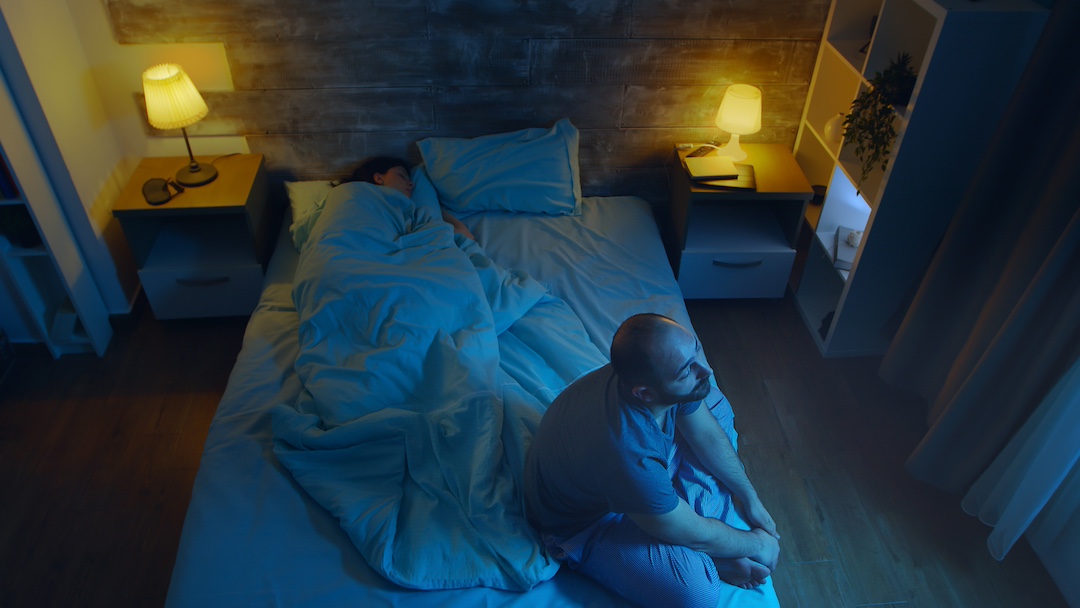Mental health and sleep are deeply connected. When sleep suffers, mental health often follows, creating a negative feedback loop that can be difficult to break. Poor sleep increases the risk of anxiety, depression, and cognitive impairment, while mental health challenges make it harder to get the rest your body and mind need. This cycle can have serious consequences, both personally and professionally.
For businesses and organizations, supporting employees’ sleep health is not just about productivity—it’s about preventing psychological injuries and fostering a healthier, more resilient workforce.
How the Cycle Works:
- Declining Mental Health – Stress, anxiety, and depression make it harder to fall and stay asleep.
- Insomnia and Poor Sleep – Difficulty sleeping leads to physical and emotional exhaustion.
- Feelings of Fatigue – Low energy levels impact focus, mood, and productivity.
- Difficulty Focusing – Impaired cognitive function reduces decision-making ability and increases errors.
- Increased Stress and Worry – Sleep deprivation raises cortisol levels, making stress harder to manage.
- Continued Sleep Disruptions – The body remains in a heightened state of stress, further preventing quality sleep, and the cycle repeats.
Over time, this loop can spiral into serious mental health conditions, making early intervention crucial for both individuals and organizations.
The Role of Sleep Disorders
While many people experience poor sleep due to stress or lifestyle factors, undiagnosed and untreated sleep disorders – especially obstructive sleep apnea (OSA) – are often at the root of chronic sleep deprivation.
Why Undiagnosed OSA is a Mental Health Risk
OSA occurs when the airway becomes blocked during sleep, causing repeated awakenings throughout the night. This leads to poor-quality sleep, excessive daytime sleepiness, and increased stress on the body and brain. Left untreated, OSA significantly increases the risk of chronic sleep deprivation. Unfortunately, many people with sleep apnea don’t realize they have it. Symptoms like loud snoring, daytime fatigue, and morning headaches are often overlooked or attributed to other causes.
The Consequences of Sleep Deprivation
Lack of quality sleep affects every aspect of mental and emotional well-being. Over time, sleep deprivation can lead to:
- Increased Risk of Depression & Anxiety: Poor sleep disrupts brain chemistry, making it harder to regulate emotions and cope with stress.
- Cognitive Decline: Sleep is essential for memory consolidation and decision-making. Without it, focus, problem-solving skills, and overall performance decline. With OSA, poor oxygen flow to the brain also affects cognition.
- Heightened Stress & Emotional Instability: Chronic sleep loss increases the production of stress hormones, making individuals more prone to burnout and emotional exhaustion.
- Reduced Emotional Intelligence: Poor sleep makes it harder to interpret social cues and regulate responses, leading to workplace conflicts and strained relationships.
- Increased Workplace Risk: Fatigue impairs reaction times, increases the likelihood of overlooking risks, and leads to more workplace accidents.
These effects don’t just impact individual well-being—they can lead to decreased workplace morale, higher absenteeism, and even an increased risk of on-the-job injuries.
How Better Sleep Improves Mental Health
The good news? Prioritizing sleep can significantly improve mental health and prevent psychological injuries. Here’s how:
- Mood Regulation: A good night’s sleep helps balance neurotransmitters and hormones that regulate emotions, reducing irritability and mood swings.
- Enhanced Cognitive Function: Sleep restores brain function, improving focus, creativity, and decision-making skills.
- Better Stress Management: Well-rested individuals respond to stress more effectively, reducing the risk of burnout and workplace fatigue.
- Increased Emotional Resilience: Those who sleep well are better equipped to handle life’s challenges and setbacks.
- Improved Physical Health: Sleep supports immune function, cardiovascular health, and hormonal balance, all of which contribute to overall well-being.
- Balanced Hormones: Sleep plays a key role in regulating hormones such as cortisol (stress), serotonin (mood), and dopamine (motivation). Disruptions in sleep can throw these hormones off balance, leading to increased stress and mood disorders.
Support Your Workforce with Sleep First
At Sleep First, we specialize in workplace sleep solutions designed to enhance mental health, productivity, and overall employee well-being. Whether you’re looking to prevent psychological injuries, reduce absenteeism, or boost workplace performance, our programs provide evidence-based strategies to improve sleep across your organization.
Concerned about undiagnosed sleep disorders in your workforce? Contact Sleep First to learn how we can help identify and address sleep issues before they impact your employee’s health and performance.






